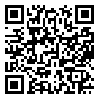Download citation:
BibTeX | RIS | EndNote | Medlars | ProCite | Reference Manager | RefWorks
Send citation to:



BibTeX | RIS | EndNote | Medlars | ProCite | Reference Manager | RefWorks
Send citation to:
Payami R, Moradi I, Sediq Maroufi S, Razmgir M S. Factors Affecting the Success of Mentoring Programs for Anesthesia Technology Students: A Systematic Review. Iranian Journal of Medical Education 2023; 23 :149-162
URL: http://ijme.mui.ac.ir/article-1-5597-en.html
URL: http://ijme.mui.ac.ir/article-1-5597-en.html
Medical Education Department, Faculty of Paramedicine, Iran University of Medical Sciences, Tehran, Iran. , sedighmaroufi.s@iums.ac.ir
Abstract: (2045 Views)
Introduction: Research results have shown that there are various factors in the success of guidance programs. Ignorance of these success factors can lead to the failure of these guidance programs. The present study was conducted with the aim of determining the effective factors in the success of guidance programs for intelligence students.
Methods: This article is a systematic review. To retrieve related studies, keywords related to mentor, mentoring, academic success, nurse anesthetist, etc.) with success factors in intelligence guidance programs in Scopus, PubMed, WOS, CINAHL, ERIC, Cochrane, Magiran, SID, Iranian Medical Articles Bank and Google Scholar search engine were investigated with the criteria of finding articles in Persian and English that referred to the guidance program for intelligence students in medical centers during the years 1990 to 2021.
Results: After removing duplicate articles, 1077 studies were screened, and according to the prisma checklist, 13 articles were eligible for inclusion and analysis in the study. Based on the results, the mentoring relationship consists of three stages before the start, during and after the completion of the program. Observing the principles of guidance at every stage leads to the formation of success in guidance. Success factors are generally categorized into four areas: personal, motivational, educational and environmental. To point out some of the characteristics of success in mentoring, it is possible to match mentor (mentor) and mentee (disciple), determine responsibilities and goals, enthusiasm, availability, non-judgement and criticism of mentor and disciple, providing constructive feedback and having awareness of He mentioned his attitude and geographical and cultural factors.
Conclusion: In order to achieve success in intelligence mentoring, it should be noted that at the very beginning, people are compatible with each other, as well as know each other's responsibilities and goals so that they can design the continuation of the mentoring program. This issue shows the higher importance of the stage before starting mentoring (the first stage) and the individual field compared to the rest of the stages and areas.
Methods: This article is a systematic review. To retrieve related studies, keywords related to mentor, mentoring, academic success, nurse anesthetist, etc.) with success factors in intelligence guidance programs in Scopus, PubMed, WOS, CINAHL, ERIC, Cochrane, Magiran, SID, Iranian Medical Articles Bank and Google Scholar search engine were investigated with the criteria of finding articles in Persian and English that referred to the guidance program for intelligence students in medical centers during the years 1990 to 2021.
Results: After removing duplicate articles, 1077 studies were screened, and according to the prisma checklist, 13 articles were eligible for inclusion and analysis in the study. Based on the results, the mentoring relationship consists of three stages before the start, during and after the completion of the program. Observing the principles of guidance at every stage leads to the formation of success in guidance. Success factors are generally categorized into four areas: personal, motivational, educational and environmental. To point out some of the characteristics of success in mentoring, it is possible to match mentor (mentor) and mentee (disciple), determine responsibilities and goals, enthusiasm, availability, non-judgement and criticism of mentor and disciple, providing constructive feedback and having awareness of He mentioned his attitude and geographical and cultural factors.
Conclusion: In order to achieve success in intelligence mentoring, it should be noted that at the very beginning, people are compatible with each other, as well as know each other's responsibilities and goals so that they can design the continuation of the mentoring program. This issue shows the higher importance of the stage before starting mentoring (the first stage) and the individual field compared to the rest of the stages and areas.
Type of Study: Review article |
Subject:
Community Based Medicine
Received: 2023/01/18 | Accepted: 2023/04/26 | Published: 2023/03/30 | ePublished: 2023/03/30
Received: 2023/01/18 | Accepted: 2023/04/26 | Published: 2023/03/30 | ePublished: 2023/03/30
Send email to the article author
| Rights and permissions | |
 |
This work is licensed under a Creative Commons Attribution-NonCommercial 4.0 International License. |






